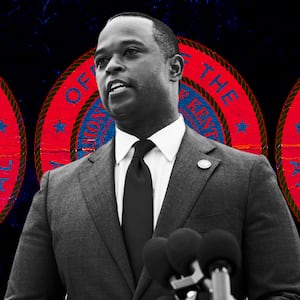When Kentucky Attorney General Daniel Cameron took office in December 2019, he became the first Republican to lead the commonwealth’s top law enforcement agency in 72 years.
More than three years later, however, one of Cameron’s first personal projects bears a number of bruises, which multiple attorneys in his office can only chalk up to the influence of politics.
That project was the office of solicitor general, a new division that Cameron created within the OAG dedicated to advocating on the commonwealth’s behalf in cases on appeal, including in high-profile matters before the Kentucky Supreme Court, the U.S. Court of Appeals for the Sixth Circuit, and the U.S. Supreme Court.
But seven current and former career attorneys within that new division are now describing years of discord, derogation, and emotional abuse, which have gutted what they say was once a tight and effective team. The lawyers also questioned hiring practices that have injected politics into their ranks, as Cameron’s administration has turned to hand-picked special appointees to fill gaps when career attorneys depart.
That last point has had a profound effect on the office. In the three-plus years since Cameron was elected, the criminal appeals division has lost more than half of its career attorneys—also known as “merit” attorneys, or, formerly, assistant attorneys general. Most of them either quit or retired early due to the work environment, the sources said.
These sources spoke under condition of anonymity, not to be quoted as either current or former employees, citing fear of professional retaliation against them or their colleagues; the division currently only employs nine career attorneys.
Compounding the problem, the sources said, Cameron has been replacing his departed “merit” employees with special attorneys—young, ambitious political appointees with beefier salaries who will phase out with the next administration. These temporary hires will then take their accumulated knowledge and experience with them when they leave—in addition to the expertise lost to the exodus of career attorneys—in a cycle that the OAG sources said will more than likely leave Cameron’s new division already in the hole.
“It will take years for this office to recover,” one attorney said.
Elections, of course, have consequences. And Cameron, as the duly elected AG, has the power to run his agency as he chooses. As the first Republican to hold the office in more than seven decades, he may have wanted to make a statement and take a fresh approach distinct from the longstanding Democratic tradition.
But halfway through his first term, Cameron declared his candidacy for governor, and he will now be leaving the legacy of those decisions—positive and negative—to a possible Democratic successor. (In 2019, Republican mayor of Hopkinsville Carter Hendricks posted an Instagram photo—archived here—of himself meeting then-candidate Cameron, writing that Cameron had “pledged not to use AG office for the ‘next campaign’” in the caption. “Very impressive!”)
Cameron’s own political future still hangs in the balance, as the rising GOP star and Sen. Mitch McConnell (R-KY) acolyte lags behind incumbent Gov. Andy Beshear—a Democrat who is also Cameron’s predecessor as attorney general.
Under Beshear, and the decades of Democrats who preceded him, Kentucky was one of the few state law enforcement systems without a solicitor general. That position brings various appeals units under one office and allows the state to speak before the courts in a unified voice. And while the creation of this new office carries theoretical efficiencies, in reality, it appears to have only made life harder for a number of career attorneys.
All seven attorneys interviewed for this article pointed the finger at the man Cameron appointed to run the criminal appeals division: deputy solicitor general Jeffrey A. Cross, who the attorneys claim has bullied and belittled dedicated public servants past the point of quitting.
All seven attorneys denounced the office environment under Cross, describing it variously as a “micromanaging nightmare,” “emotionally abusive,” “toxic,” “humiliating,” and “relentless.”
Cross, the sources said, has at times stripped cases from career attorneys who have built them, passing them instead to appointees when the time comes to present arguments in the spotlight. He has jammed up their work with a redundant and demeaning review process, they said, which has led to blown deadlines and at times caused hardened trial lawyers to break down in despair. (Cross, three attorneys claimed, would sometimes use personal information against his employees.)
The Daily Beast previously reported internal complaints filed against Cross, detailing public shamings, hostile treatment of attorneys, manipulating personal information, and anger issues. While an internal investigation found the complaints were “unsubstantiated,” The Daily Beast’s interviews did substantiate them.
In fact, every attorney interviewed for this article criticized the investigation’s finding, and either related their own experiences with Cross or their independent knowledge of how he treated their colleagues—including “shouting matches” and routine verbal beratement.
They all confirmed that Cross had long been acknowledged as problematic in the office, but described a culture of intimidation that deterred whistleblowers from coming forward. To the attorneys, these work conditions seemed designed, for whatever reason, to pressure the division’s career, non-political lawyers—holdovers whose work continues from administration to administration, despite which party is in charge.
But it’s unclear how much Cameron knows about the turmoil, or how frequently he has checked in on the health of this office that he himself created.
The sources all told The Daily Beast that they rarely interacted with Cameron, if ever. (HuffPost previously reported that Cameron had never used his personal key fob to access the state Capitol during his tenure, though they did find images of him inside the building.) They all observed the young attorney as being openly politically ambitious while remaining disengaged from their work, even uninterested, though two sources also spoke admirably about different policies he’d enacted.
Two attorneys described Cameron independently as a “ghost,” and most of these sources said they had never met him personally, marking that behavior as a stark contrast from prior AGs.
“He’s never there, doesn’t weigh in on our briefs, never says ‘hello,’” one attorney said. “We sometimes wonder who’s really running the show.”
“I thought that Cameron would be a great AG,” another attorney said. “The decisions I saw him making were good, and I thought he came into the job with a lot of integrity. You don’t typically have that much interaction with the AG if you’re an assistant attorney within one of the divisions. But he’s responsible for who’s appointed, and ultimately he answers for the office.”
That goes for Cameron’s choices to run the OAG’s various divisions—like Cross, Cameron’s pick as deputy solicitor general for criminal appeals. But Cameron’s responsibility extends to lower-level appointees as well. And as the career attorneys began to peel away, Cameron made another change in tradition.
“At first we didn’t even know what [these special attorneys] were,” one OAG attorney told The Daily Beast. “He was paying his buddies extremely high salaries, for what work I don’t know.”
“Seemed like they were more interested in building CVs than doing what’s best for the State,” another attorney remarked of the appointees.
“I loved my job with previous AGs, and the mission was always the same: Do the right thing, be moral, be just, be brave. It was never ‘write this in this way because it’s the political position we want to take,’” another attorney said. “We were making the world a better place, and then it stopped.”
A number of merit attorneys succumbed to the pressures under Cross, either quitting outright or “retiring” early, according to interviews and staff records. But Cross’ behavior went unaddressed by Cameron’s office for more than three years, until Aug. 15, the day that The Daily Beast published a report revealing human resources complaints against him from 2021.
In response to a new public records request from The Daily Beast, the OAG withheld 22 responsive records, citing exemptions for “preliminary material,” which would include emails and interviews. Then, on the morning of Aug. 15, Cross resigned as deputy solicitor general and transferred to an appointed special attorney position, according to an internal email, with “no break in service.”
“This email serves as notice that I am resigning my position as Division Director of the Division of Criminal Appeals of the Office of the Attorney General effective 8/15/23 contingent upon my appointment by the appointing authority to the position of Special Attorney effective 8/16/23,” Cross wrote in the email, which The Daily Beast obtained through an open records request. “There will be no break in service.”
Cross sent that letter at 8:13 a.m., on Aug. 15. The Daily Beast had asked Cameron’s office for comment the previous afternoon.
Despite the resignation, the OAG website still listed Cross as deputy solicitor general for criminal appeals for several weeks. He was removed from the page this week, sometime after The Daily Beast reached out with questions for this article. We archived the website as it looked on Monday, listing his name.
Cross did not answer or reply to text messages when contacted at phone numbers associated with him in public records. The Daily Beast also emailed questions to his OAG address, but did not receive a reply.
After Cross was removed from the page, an OAG spokesperson responded to The Daily Beast’s emailed comment request. The detailed request noted that a number of attorneys had offered criticisms of Cross and an office environment that has “negatively impacted the division’s work and their personal well-being.”
The Daily Beast’s comment request noted that these attorneys still don’t understand why no action had been taken against Cross, and that they see Cameron as “distant, unresponsive, and disengaged.” The email added that attorneys feel the mistreatment was “specifically targeted” and “can think of no explanation beyond political motivations.” The request asked why Cross resigned, and whether the OAG or Cameron himself, who created the office, would like to comment on these claims.
The OAG spokesperson’s statement, printed in full below, did not address these questions. Instead, the statement pointed to the previously reported 2021 investigation and went on to defend Cross’ character.
“The Attorney General’s Office has the utmost respect for its employees and takes all complaints seriously. When a complaint is filed, the Office’s human resources department fully and carefully investigates the matter and takes action when warranted. Every employee is also aware of the process for filing complaints with the Personnel Cabinet,” the statement said.
“Mr. Cross has spent over a decade with the agency in both merit and non-merit roles, working for several consecutive attorneys general,” the statement continued. “The complaint against him was thoroughly investigated and found to have no merit.”
Presented with the spokesperson’s comment, one attorney called it “infuriating.” Another said it was “par for the course.”
“That ridiculous investigation finding created an atmosphere where he became bulletproof,” another OAG attorney said. “How on earth would you expect anyone to come forward with anything new after that?”
Spokespeople for the Cameron campaign and the Republican Party of Kentucky didn’t reply to a comment request.
While cynics may write such complaints off as common office drama, the lawyers in criminal appeals are no shrinking violets. The sources who spoke with The Daily Beast have more than a century of combined courtroom experience among them. And criminal appeals is particularly rough work, where attorneys are tasked with delivering justice on behalf of the commonwealth in some of the most stomach-churning cases imaginable, including violent crimes, often presenting high-stakes arguments to state and federal appellate courts under scrutiny from the public and the media.
“We get the worst of the worst, heinous cases, where children are beaten to death, raped—just tremendously awful cases that stay with you the rest of your life, and we fought for the victims of these heinous crimes,” one attorney told The Daily Beast. “That was all taken away from us because we didn’t use the correct commas.”
In return, these attorneys take home a salary comparable to the average cost of tuition at many law schools, with some staff attorneys making as little as $4,465 per month ($53,580 a year) as of this April, according to state data. The appointed special attorneys command a significantly larger starting salary, often in the mid-$80,000 range, the data shows, with one special attorney in the office of solicitor general pulling six figures. Cross makes $100,000, according to the data.
But under Cross, these seasoned litigators have felt routinely browbeaten and disparaged, stripped of their customary autonomy and the pride they once took in carrying the mantle of justice. All seven sources told The Daily Beast that life under Cross got so brutal that attorneys began to seek professional help—not because of the nature of their cases, but as a result of their own work environment.
(“We were already traumatized,” quipped one attorney who went into therapy.)
The details surrounding Cross’ own appointment are opaque. He first joined the OAG in 2004, worked for years as an assistant attorney general in criminal appeals, then departed in 2019 under murky circumstances. But when Cameron created the office of solicitor general, Cross rejoined the team, seemingly “out of nowhere,” several attorneys recalled.
The Daily Beast submitted an open records request for documents related to Cross’ hiring, but only received his initial application from 2004. His 2020 onboarding was reflected in his notice of appointment as deputy solicitor general, with no accompanying application paperwork or internal communications related to that process.
Cross, however, was the neighbor of Cameron’s Deputy AG Vic Maddox. He mentioned that fact in a December 2019 text message to an attorney in the OAG, in which Cross—at the time still in private practice—was apparently trying to get inside information from Maddox about plans to intervene in a constitutional matter.
“What is the email address of Vic Maddox (new head of Civil Division)? I need to ask him a question about whether he intends to intevene [sic] in a case (constitutional challenge),” Cross wrote in the message, which was obtained by The Daily Beast.
It’s unclear whether Maddox provided the information. Cross was appointed three months later.
Cameron’s tenure appears to have been a boon for young lawyers eager to burnish their cred. Special attorneys aren’t unique to the solicitor general; they heavily populate the OAG’s larger divisions, as well. Staff records from this earlier year show 20 special attorneys working on the civil litigation team, with another 13 on the criminal side—double the number of career attorneys in each division.
As for criminal appeals, that office has lost more than half its career lawyers under Cameron.
“There were approximately 23 merit attorneys when they took over. There are nine attorneys left,” one of the attorneys told The Daily Beast, numbers that multiple sources confirmed. “The void has been filled with non-merit, special attorneys, who tend to primarily be young, politically connected attorneys who have come back to Kentucky from Washington, D.C., and leave when the administrations change.”
This person noted that after word of the departures got out, jobseekers stopped applying for merit spots.
“Government attorneys learn very quickly to avoid agencies that always have openings,” the attorney said.
That’s largely because career prosecutors accumulate a specific knowledge base over time. And when they leave en masse, as one OAG attorney put it, “That’s a lot of institutional knowledge walking out the door.”
The merit attorneys all took the job under the assumption that their employment was abiding, career-oriented, and independent of political winds.
“Politics aren’t supposed to affect us, right?” one attorney remarked. “Easy for them to say, maybe, but it hasn’t quite turned out that way.”









